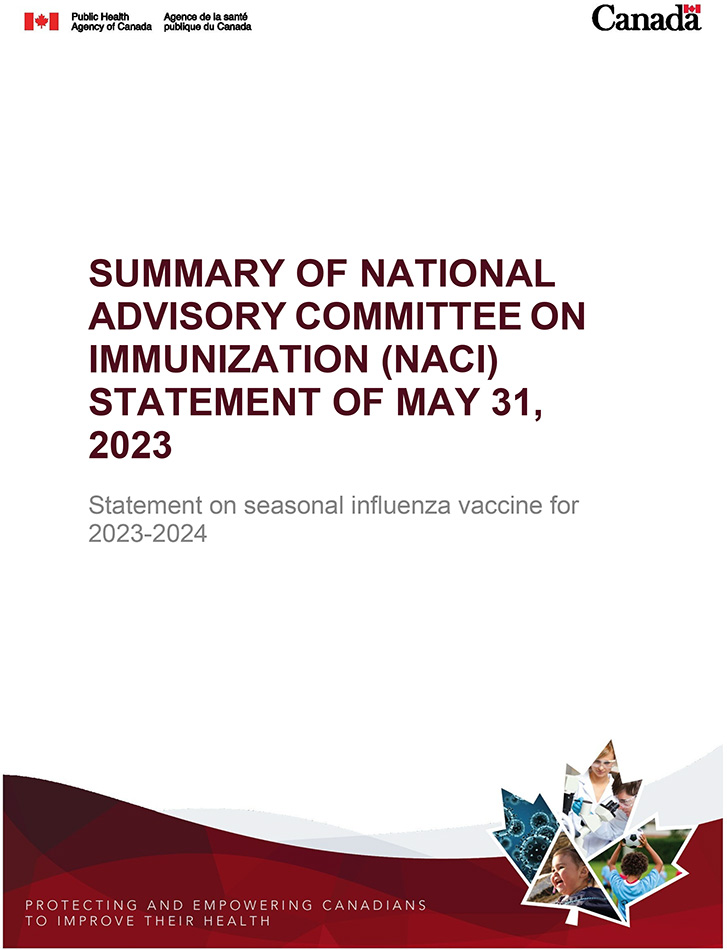Summary of the National Advisory Committee on Immunization statement on seasonal influenza vaccine for 2023-2024
Download in PDF format
(318 KB, 4 pages)
Organization: Public Health Agency of Canada
Date published: 2023-05-31
Cat.: HP40-114/2023E-PDF
ISBN: 978-0-660-48423-5
Pub.: 230055
An Advisory Committee Statement (ACS)
National Advisory Committee on Immunization (NACI)
On this page
Overview
- On May 31, 2023, the Public Health Agency of Canada (PHAC) released recommendations from the National Advisory Committee on Immunization (NACI) on the use of seasonal influenza vaccines for the 2023-2024 season. This guidance is based on current evidence and expert opinion.
- A seasonal influenza vaccine is the most effective way to help prevent influenza and its complications. The vaccine can also help prevent the spread of the virus to others. Seasonal influenza vaccines are safe and recommended for almost everyone who is 6 months of age and older.
- NACI provides advice on the use of seasonal influenza vaccines many months before the next season to help provinces and territories plan their seasonal vaccine programs ahead of time.
NACI continues to recommend that:
- A seasonal influenza vaccine should be offered annually to anyone 6 months of age and older who does not have contraindications to the vaccine. It is particularly recommended for the following groups: (Strong NACI Recommendation)
- People at high risk of severe disease, influenza-related complications, or hospitalization
- Children 6 months up to 5 years of age
- Adults 65 years of age and older
- Adults and children with certain chronic health conditions
- Individuals who are pregnant
- People of any age who are residents of nursing homes and other chronic care facilities
- Indigenous peoples
- People who can pass the influenza virus to those at high risk
- Healthcare and other care providers, including childcare providers
- Household contacts of people at high risk
- People who provide essential community services
- Healthy individuals working in essential services (e.g., grocery, pharmacy, utility services) where absenteeism due to illness would cause an interruption in essential services
- People in direct contact with poultry infected with avian influenza during culling operations
- People at high risk of severe disease, influenza-related complications, or hospitalization
- When children 6 months to less than 9 years of age receive a seasonal influenza vaccine for the first time, they should be given 2 doses 1 month apart. Afterwards, they only need 1 dose every fall.
- If a seasonal influenza vaccine is given for the first time to an individual 9 years of age or older, only 1 dose is recommended for that year and future years.
- Household contacts of infants younger than 6 months of age, or members of a household expecting a newborn during the influenza season, are recommended to receive the influenza vaccine because infants younger than 6 months are at high risk but cannot receive the vaccine.
For the full statement, including supporting evidence and rationale, please see NACI Statement on Seasonal Influenza Vaccine for 2023-2024.
What you need to know
- Influenza is a contagious respiratory illness caused primarily by influenza A and B viruses. In Canada, the influenza season generally happens in the late fall and winter months.
- Seasonal influenza can cause mild to severe illness. Most people recover within a week to 10 days, but some groups are at higher risk of experiencing severe illness, complications (like pneumonia) or worsening of chronic health conditions (like heart disease).
- Groups at higher risk include young children, older adults (65+), people with chronic health conditions, people who are pregnant and Indigenous Peoples.
- The seasonal influenza vaccine is needed every year because protection from the vaccine decreases over time and the strains of the virus that circulate can change from year to year. Before every influenza season, international experts provide advice on the specific strains of influenza viruses that should be included in the vaccine for the upcoming season.
- Seasonal influenza vaccines can be given at the same time as, or at any time before or after, other vaccines.
- There are several seasonal influenza vaccines available in Canada, some of which are only authorized for specific age groups. Please talk to your healthcare provider or local public health authority to determine which vaccine is recommended for you.
For the full statement, including supporting evidence and rationale, please see NACI Statement: Statement on Seasonal Influenza Vaccine for 2023-2024.
For more information on NACI recommendations related to seasonal influenza vaccination, please see the Canadian Immunization Guide Chapter on Influenza and Statement on Seasonal Influenza Vaccine for 2022-2023.
